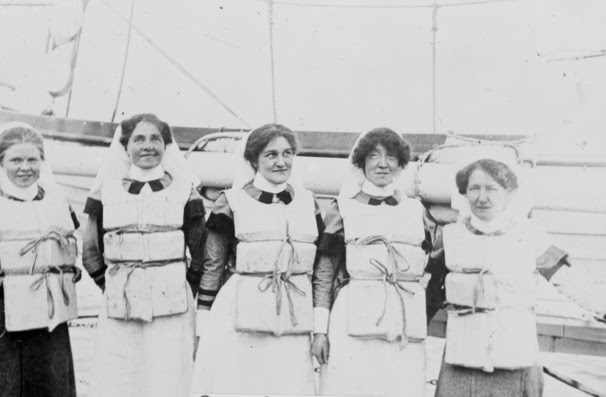I admit to not being a fan of Vera Brittain. Over the decades she has forged a prominent position both in biographies and items throughout various media, but I've never understood exactly why. She worked as a VAD during the First World War and wrote a considerable amount about her experiences, her life and her losses. Because of that, she has emerged as an icon among nurses during the Great War, eclipsing almost all others, trained or otherwise. She’s become a national model for the ‘war nurse’ despite her story being one shared by thousands of other women. Many worked for a far longer period during wartime; many were honoured in a number of ways with commendations and awards; thousands suffered the loss of loved ones due to enemy action; hundreds suffered more personal loss than did Vera Brittain. And of course, she was not a trained nurse, but an amateur – an inexperienced volunteer.
However articulate, however smooth and emotive her writing, my relationship with her stuttered and came to a very rocky end when I got to a passage in ‘Testament of Youth’ in which she resorted to a spiteful and vindictive attack on one of the most honourable, brave and trustworthy members of Queen Alexandra’s Imperial Military Nursing Service. On her way to Malta in 1916 on board the ill-fated hospital ship Britannic she described the Matron as ‘a sixty-year-old dug-out with a red cape and a row of South African medals.’ Later, recounting the tale of another nurse who had been on board the ship when it was torpedoed the following year, she wrote:
The old Matron, motionless as a rock, sat on the boat deck and counted the Sisters and nurses as they filed past her into the boats, refusing to leave until all were assembled. None of the women were lost … In one of the boats sat the Matron, looking towards the doomed Britannic while the rest of its occupants, with our friend among them, anxiously scanned the empty horizon. She saw the propeller cut a boat in half and fling its mutilated victims into the air, but, for the sake of the young women for whom she was responsible, she never uttered a sound nor moved a muscle of her grim old face. What a pity it is, I meditated as I listened, that outstanding heroism seems so often to be associated with such unmitigated limitations! How seldom it is that this type of courage goes with an imaginative heart, a sensitive, intelligent mind!
 |
| British nurses on board a hospital ship : Australian War Memorial |
 |
| South Africa during the 2nd Anglo-Boer War |
I am sure that you know that I am much more grateful than I can possibly express for all you have done for the last very strenuous five years. The loyalty and devotion to duty of the retired Matrons of the Q.A.I.M.N.S. who so readily returned to do their bit as soon as we were involved in this War will never be forgotten.
There were, of course, thousands of other trained members of the British military nursing services, but few with such a long and impressive history as Elizabeth Ann Dowse. I cannot tell whether, as Vera Brittain inferred, she was unimaginative, unintelligent and insensitive, though I suspect she was none of those. What I am quite sure of is which of the two women I would trust in life, especially in a sticky situation, and which of the two I would choose to meet with and talk to today.
*****
Testament of Youth; Vera Brittain; first published by Victor Gollancz Ltd., 1933 and in many later editions

Yes, but the point is that Vera Brittain's book stands head and shoulders above other books by women about the Great War - including Mary Borden - as great literature. It may not always be great history, but it moves readers after 80 years and provides us with a perspective on women and the war that would otherwise be less prominent. As for the comments she makes about QA nurses, these are also representative of the rivalrous relationship between VADs and trained nurses during the war, as Brittain herself recognised. Incidentally, I can't wait for the big screen version of Testament, opening in January.
ReplyDeleteMy problem is that Vera Brittain's view has become the face of British nursing in the FWW and is taken as an accurate historical record - so few people bother to look further afield. The ease with which the 'literary' women's accounts have become 'truth' has diminished the actual story. Of course, writing on your own blog gives a great freedom to express a personal opinion, and I'm completely aware that mine is not that of the majority :-)
ReplyDelete